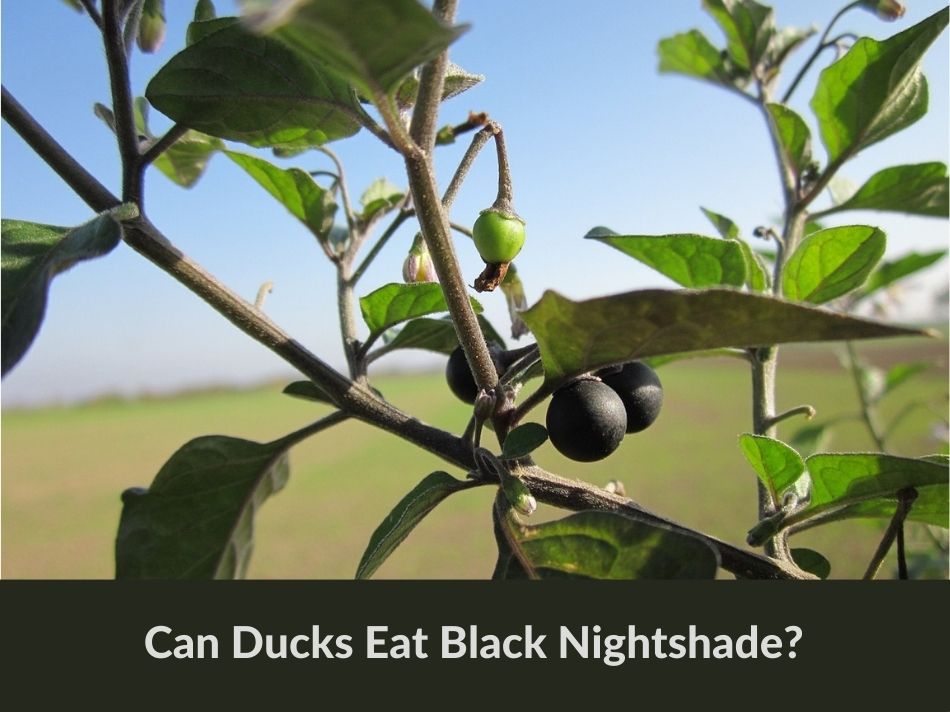Ducks are omnivorous, meaning they consume both plant and animal matter. In the wild, they forage for a varied diet that includes small fish, insects, worms, aquatic plants, seeds, and even small amphibians. But, can ducks eat black nightshade?
No, ducks should not eat black nightshade. The berries and the leaves can contain solanine which is a natural pesticide and glycoalkaloid poison. Symptoms can range from gastrointestinal distress to more severe neurological effects.
In this concise write-up, we’ll uncover the dietary patterns of ducks, discuss the implications of feeding them Black Nightshade, and address the concerns of both caretakers and park visitors who might consider giving this plant to our feathery friends.
What Is Black Nightshade?
Black Nightshade belongs to the Solanaceae family, which also includes plants like tomatoes, potatoes, and bell peppers. While some parts of these plants are edible for humans and animals, certain parts, particularly when green or unripe, can contain toxic compounds.
Black Nightshade berries, when fully ripe and black, are often eaten by various birds and even some people in certain cultures.
They have been used traditionally for medicinal purposes and as a food source. On the contrary, unripe, green berries, as well as the leaves and stems of the plant, contain solanine, a glycoalkaloid toxin.
Ducks And Plant Ingestion
Ducks, by nature, are omnivores. They forage on a variety of foods, from small insects and aquatic plants to seeds and greens. When roaming free, ducks might nibble on various plants, including those that might be potentially toxic. It’s a part of their exploratory behavior.
Effects of Solanine on Ducks
Solanine is known to be toxic to many animals, including ducks. When ingested in significant amounts, solanine can cause symptoms such as:
- Nausea
- Diarrhea
- Vomiting
- Stomach cramps
- Slowed heartbeat
- Respiratory depression
While the exact amount of solanine that might cause these symptoms in ducks is not well-documented, it’s advised that duck owners and caretakers be cautious about allowing their ducks to consume large quantities of Black Nightshade, especially the green berries or the leaves.
Observations From Wildlife
In the wild, many birds, including ducks, seem to have an innate ability to gauge what’s safe to eat and what’s not. There have been observations of wild ducks consuming ripe Black Nightshade berries without any noticeable adverse effects.
This may indicate that they inherently know to avoid the unripe berries or leaves or that the small amounts ingested don’t harm them.
Recommendations For Duck Owners
For those who keep ducks in contained areas or backyards:
- Monitor the growth of potentially harmful plants like Black Nightshade.
- Remove the plants or restrict access if noticed in abundance.
- Always provide ducks with a variety of safe and known foods so they don’t rely solely on foraging.
- If a duck displays signs of distress after consuming unknown plants, consult a veterinarian immediately.
Other Plants & Berries Ducks Can Eat
Ducks are quite versatile in their diet and can benefit from a variety of plants and berries. Apart from the commonly known foods, ducks can forage on various berries and plants that provide them with essential nutrients and antioxidants.
Below are some berries and plants ducks can safely eat:
- Blackberries
- Blueberries
- Gooseberries (don’t let them eat the bush and leaves because it’s toxic.)
- Hostas
- Poison Ivy
Conclusion
Black Nightshade, when fully ripe, might not pose a significant threat to ducks, especially if consumed in small amounts. Yet, due to the presence of solanine in unripe berries, leaves, and stems, it’s best to exercise caution.
By being observant and proactive, duck owners can ensure the safety and well-being of their feathered friends.
Disclaimer: The information in this article is for informational purposes only. I'm not an expert or a veterinarian.


